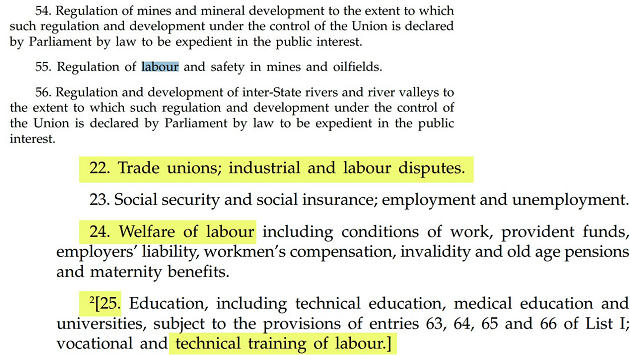Table of Contents

- Yogi Adityanath-led Uttar Pradesh government has cleared an ordinance that suspends most of the labor laws for a period of three years.
- The ordinance has been sent to Governor Anandiben Patel for her approval.

INDUSTRIES COVERED?
- The ordinance covers all the existing industries and manufacturing units as well as the new ones that are coming up in a few years.
LABOUR LAWS SUSPENDED?
- All labor laws related to-
- Labor unions, settling work disputes, regulations for working conditions, contracts, among others shall be suspended for three years in Uttar Pradesh under this ordinance.
- This includes –
- The Minimum Wages Act,
- The Maternity Benefit Act,
- The Equal Remuneration Act,
- The Trade Unions Act,
- The Industrial Employment Act,
- The Industrial Disputes Act,
- The Factories Act.
LAWS EXEMPTED?
- Bonded Labour System (Abolition) Act, 1976;
- Employee Compensation Act, 1923
- (statutory liability upon an employer to discharge his moral obligation towards employees when they suffer from any physical disabilities or diseases, during the course of employment in hazardous working conditions);
- Building and Other Construction Workers Act, 1996
- (safety, health and welfare measures); and
- Section 5 of Payment of Wages Act, 1936
- (ensure timely payment of daily wages).
- The state government said in its statement:
- “For encouraging new investments, setting up new industrial infrastructure and benefit of existing industries and factories, it is imperative that they are provided temporary exempted from the existing labor laws in the state.
- Therefore, it is important that existing labor laws in Uttar Pradesh are relaxed for a period of three years.
- To this end ‘Uttar Pradesh Temporary Exemption from Certain Labour Laws Ordinance, 2020’ has been introduced,“
ARGUMENTS IN FAVOUR
- Employment to workers who have migrated back to the state by providing flexibility to the business and industry.
- Workers will continue to be protected, as some of the labour laws have been kept intact.
- It will help to re-skill and map the workers who have been displaced and re-employ them as per the needs of the
- Experts believe that these laws, “while well intentioned, have had terrible unintended consequences of creating a monstrous unorganised sector”.
- Indian regulations make labour “more costly”.
- So either firms switch to capital, or don’t hire labour.
- Instead ‘contract out’ using middlemen to supply workers without formal contracts.
- This is not just to avoid paying above market wages, but also to avoid compliance costs
- 90% of India’s labourers did not have the legal protections
ARGUMENTS AGAINST
- Given the size of the population,
- Even the formal sector is made up of several lakh workers, who will be affected by the ordinance.
- If states want to protect the unorganised workers, the legislation was there-
- The Unorganised Workers’ Social Security Act in 2008
- But till date, no state has implemented it
- The ordinance could result in the termination of the services of all permanent employees and
- They would be replaced with contract workers.
- It has arbitrarily and absolutely unfairly done away with the very basic rights of all those covered by labour laws


Latest Burning Issues | Free PDF






















 WhatsApp
WhatsApp